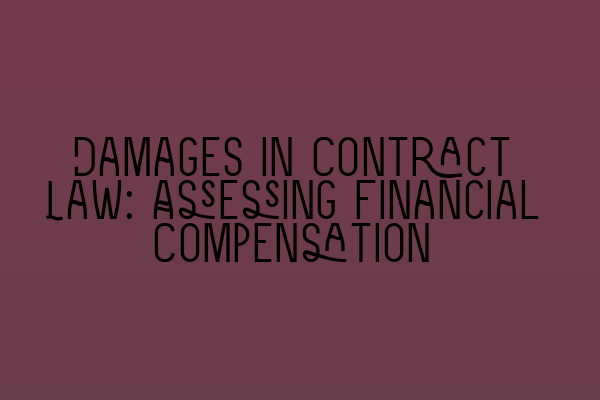Damages in Contract Law: Assessing Financial Compensation
Contracts form the backbone of business transactions and provide security and predictability for parties involved. However, there are instances when one party fails to fulfill their obligations under a contract, resulting in a breach. When a breach occurs, it is essential to understand the concept of damages in contract law and how financial compensation is assessed.
Damage is a legal term used to refer to the amount of money awarded to the innocent party in a contract dispute to compensate for the loss or harm caused by the breach. The aim of damages is to put the injured party in the position they would have been in if the contract had been performed correctly.
There are several types of damages that can be awarded in contract law, including:
1. Compensatory Damages
Compensatory damages are designed to compensate the innocent party for the actual loss suffered as a result of the breach of contract. The amount awarded is calculated by considering various factors, including the actual loss incurred, foreseeable loss, and the remoteness of the damages.
When assessing compensatory damages, the court takes into account both the financial loss and non-financial loss. Financial loss includes any out-of-pocket expenses, such as the cost of finding an alternative supplier or repairing damaged property. Non-financial loss, on the other hand, refers to the loss of reputation, loss of business opportunities, or emotional distress caused by the breach.
It is important to note that compensatory damages aim to restore the injured party, not to punish the breaching party.
2. Consequential Damages
Consequential damages, also known as special damages, are awarded to compensate for the indirect or foreseeable damages resulting from the breach of contract. These damages go beyond the direct losses and cover any additional losses that occur as a consequence of the breach.
For example, if a supplier fails to deliver goods as agreed, resulting in the loss of a lucrative contract for the buyer, the buyer may be entitled to consequential damages to compensate for the lost business opportunity.
However, it is essential for the injured party to prove that the consequential damages were directly caused by the breach and that they were reasonably foreseeable at the time of entering into the contract.
3. Liquidated Damages
Liquidated damages are predetermined damages agreed upon by the parties at the time of forming the contract. They serve as a pre-estimate of the actual loss that would be suffered in the event of a breach.
These damages are commonly included in contracts for construction projects, where the parties agree to a specific amount that will be payable in the event of a delay or failure to meet certain performance standards.
It is crucial, however, that liquidated damages are not excessive or punitive in nature. If they are deemed unreasonable by the court, they may be considered penalty clauses and may not be enforceable.
4. Nominal Damages
Nominal damages are a small monetary award given to the injured party when a breach of contract has occurred, but the actual loss suffered is negligible or difficult to quantify. It serves as a legal recognition of the breach.
For instance, if a contractor fails to complete a minor repair job as agreed, resulting in no significant financial loss to the property owner, the court may award nominal damages as a symbolic compensation.
Although the amount awarded as nominal damages is typically small, it reinforces the principle that contractual obligations should be upheld.
5. Restitutionary Damages
Restitutionary damages, also known as disgorgement of profits, aim to prevent the breaching party from unjustly benefiting from the breach of contract. These damages require the breaching party to surrender any profits or benefits they have gained as a result of the breach.
For example, if a software developer breaches a contract and sells their software to another client, the innocent party may be entitled to restitutionary damages to recover the profits made by the developer from the unauthorized sale.
Restitutionary damages serve as a deterrent against breaching contracts with the intention of profiting from the breach.
Conclusion
Assessing financial compensation in contract law can be a complex process. It requires a thorough analysis of the type of damages claimed, the nature of the breach, and the extent of the loss suffered by the innocent party. By understanding the various types of damages available, parties can better protect themselves when entering into contracts and seek appropriate remedies in case of a breach.
If you have further questions about damages in contract law or need professional legal advice, our team of experienced solicitors at SQE Contract Law is here to help. Contact us today to schedule a consultation.
Related Articles:
- Mentorship for Aspiring Solicitors: Nurturing Talent in the Legal Field
- Exploring Alternative Dispute Resolution: An Effective Approach to Legal Conflicts
- Navigating the Legal Practice Course (LPC): Your Path to Solicitor Qualification
- Mastering Client Care Skills: Essential for Solicitors
- Legal Challenges and Pitfalls: Strategies for Navigating Complexities
